
1818 Frankenstein published:
The book, by 21-year-old Mary Wollstonecraft Shelley, is frequently called the world's first science fiction novel. In Shelley's tale, a scientist animates a creature constructed from dismembered corpses. The gentle, intellectually gifted creature is enormous and physically hideous. Cruelly rejected by its creator, it wanders, seeking companionship and becoming increasingly brutal as it fails to find a mate.
Mary Shelley created the story on a rainy afternoon in 1816 in Geneva, where she was staying with her husband, the poet Percy Bysshe Shelley, and their friend Lord Byron. Byron proposed they each write a gothic ghost story, but only Mary Shelley completed hers. Although serving as the basis for the Western horror story and the inspiration for numerous movies in the 20th century, the book Frankenstein is much more than pop fiction. The story explores philosophical themes and challenges Romantic ideals about the beauty and goodness of nature. [Note: the beauty and goodness of nature were hard to find, for example, at Auschwitz, where evil doctors played with the dismembered organs of live corpses.‑‑Ed.]
1853 (March 11-13): A US military force invades rebellion-torn Nicaragua: a scenario that will repeat itself again in 1854, 1857, 1867, 1894, 1896, 1898, 1899, 1910, 1912-1925, and 1926-1933.
1863 Countdown to Infamy:
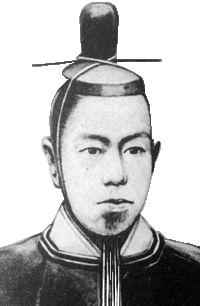
Emperor Kōmei, breaking with centuries of imperial tradition, begins to take an active role in matters of state by issuing his "Order to expel barbarians" (jōi jikkō no chokumei). A deadline for the expulsion is for May 11. (Craig) [See: Countdown to Infamy: Timeline to Pearl Harbor.]
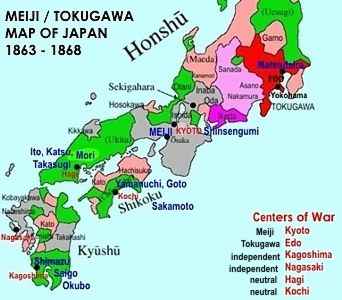
Although foreign attempts at penetration and reciprocal Japanese awareness of outsiders had increased, the arrival of Matthew Perry's powerful squadron of American warships in 1853 was nonetheless a profound shock to both the Tokugawa Shogunate and its subjects . . . . For over two hundred years Japanese society, culture, and technology had remained crystallized. Suddenly, Perry confronted the Japanese with devices such as the telegraph, the steam locomotive, and, most disturbing of all, massively superior armaments which he used to browbeat the Tokugawa Shogunate into signing a commercial treaty, soon followed by similar agreements with other imperial states. Like other traditional societies thrust into the same predicament, the Japanese were humiliated and fearful of further encroachment. Yet their reaction was quite different. Rather than accept their fate passively, the Japanese almost instinctively set about to redress the military imbalance.
Up to this point Japanese military power had been concentrated exclusively in the hands of a hereditary class of samurai, and it might be expected that this class would have provided the primary impetus for a military renascence. In the main, this did not prove true. In Choshu, as a result of an internal struggle, a group of radical samurai had become the dominant force internally and, at the behest of the eldest local lord, began reorganizing his army under the brilliant leadership of Takasugi Shinsaku. A close student of Western military science, Takasugi was also a violent partisan of the "sonno joi" (revere the emperor, expel the barbarian) movement. With the European example as a reference point, he began recruiting a force without regard to social background and equipping them with the latest Western Minie ball-firing rifles. Still wed to traditional military practice, the Tokugawa samurai sent to put down this well-armed, peasant-based force relied on the bow, the sword, and the tactics of old Japan, and was defeated accordingly.
1879 Japan: ShŠTai, the last king of the Ryūkyū Kingdom, abdicates when the kingdom is annexed by Japan and becomes Okinawa Prefecture. [For further information, click here.]
1880 Birth: Harry Hamilton Laughlin: leading American eugenicist in the first half of the 20th century:
The Reichstag of Nazi Germany passed the Law for the Prevention of Hereditarily Diseased Offspring in 1933, loosely based on Laughlin's model . . . . One of Laughlin's key interests was to aid in the proliferation of compulsory sterilization legislation in the United States, which would presumably sterilize the "unfit" members of the population. By 1914, 12 states had already passed sterilization laws, beginning with Indiana in 1907 and Connecticut in 1909, however in most states the laws were not employed with significant vigor (California was the sole exception to this). In his study of this "problem," Laughlin deduced that much of the state sterilization legislation was poorly worded and left it open to questions of constitutionality and confusion over bureaucratic responsibility. As a result, Laughlin drafted a "model law" for compulsory sterilization which would satisfy these difficulties, and published them in his 1922 study of American sterilization policy, Eugenical Sterilization in the United States. It included as subjects for eugenic sterilization: the feeble minded, the insane, criminals, epileptics, alcoholics, blind persons, deaf persons, deformed persons, and indigent persons. An additional 18 states passed laws based on Laughlin's model, including Virginia in 1924. The first person ordered sterilized in Virginia under the new law was a woman named Carrie Buck, on the grounds that she was the "probable potential parent of socially inadequate offspring." A lawsuit ensued and Laughlin, who had never met Buck, gave a deposition endorsing her suitability for sterilization, calling the family members of "the shiftless, ignorant, and worthless class of anti-social whites of the South.
1915 World War I: Battle of Neuve Chapelle: German Magazine Commentary on its second day by Margarete Munsterberg:
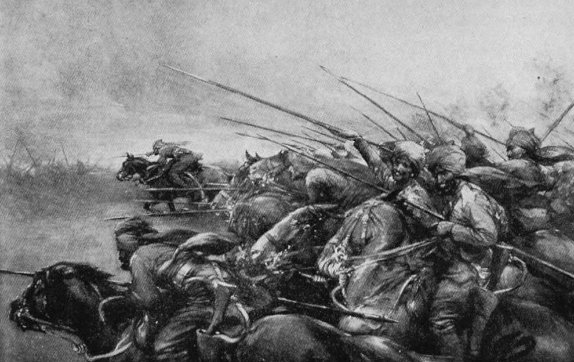
The English, advancing in great masses, were [mown] down in sections. Meanwhile, the fight over Neuve Chapelle continued. Here, Indian troops rushed ahead, and seemingly unarmed. In the preceding days numerous Indians had deserted to our lines, hence our troops believed that in this case they were again dealing with deserters, and so did not shoot. This sin of omission was thoroughly avenged; for close before our positions the Indians began to throw hand grenades and attacked the garrison of our trenches with knives.
1916 World War I: Fifth battle of the Isonzo: Like its predecessors, this battle is a succession of inconclusive conflicts.
1917 World War I: Iraq: After several days of fighting along the Diyala River, General Frederick Stanley Maude enters Baghdad with 50,000 British and Indian troops. He then launches three columns up the Tigris, Euphrates, and Diyala rivers, securing his hold on the city and capturing 9,000 Turkish prisoners.
1918 First cases reported in deadly influenza epidemic:
Just before breakfast on the morning of March 11, Private Albert Gitchell of the U.S. Army reports to the hospital at Fort Riley, Kansas, complaining of the cold-like symptoms of sore throat, fever and headache. By noon, over 100 of his fellow soldiers had reported similar symptoms, marking what are believed to be the first cases in the historic influenza epidemic of 1918. The flu would eventually kill 675,000 Americans and more than 20 million people (some believe the total may be closer to 40 million) around the world, proving to be a far deadlier force than even the First World War.
The initial outbreak of the disease, reported at Fort Riley in March, was followed by similar outbreaks in army camps and prisons in various regions of the country. The disease soon traveled to Europe with the American soldiers heading to aid the Allies on the battlefields of France. (In March 1918 alone, 84,000 American soldiers headed across the Atlantic; another 118,000 followed them the next month.) Once it arrived on a second continent, the flu showed no signs of abating: 31,000 cases were reported in June in Great Britain. The disease was soon dubbed the Spanish flu due to the shockingly high number of deaths in Spain (some 8 million, it was reported) after the initial outbreak there in May 1918.
The flu showed no mercy for combatants on either side of the trenches. Over the summer, the first wave of the epidemic hit German forces on the Western Front, where they were waging a final, no-holds-barred offensive that would determine the outcome of the war. It had a significant effect on the already weakening morale of the troops; as German army commander Crown Prince Rupprecht wrote on August 3: poor provisions, heavy losses, and the deepening influenza have deeply depressed the spirits of men in the III Infantry Division. Meanwhile, the flu was spreading fast beyond the borders of Western Europe, due to its exceptionally high rate of virulence and the massive transport of men on land and aboard ship due to the war effort. By the end of the summer, numerous cases had been reported in Russia, North Africa and India; China, Japan, the Philippines and even New Zealand would eventually fall victim as well.
The Great War ended on November 11, but influenza continued to wreak international havoc, flaring again in the U.S. in an even more vicious wave with the return of soldiers from the war and eventually infecting an estimated 28 percent of the country's population before it finally petered out. In its December 28, 1918, issue, the American Medical Association acknowledged the end of one momentous conflict and urged the acceptance of a new challenge, stating that Medical science for four and one-half years devoted itself to putting men on the firing line and keeping them there. Now it must turn with its whole might to combating the greatest enemy of all: infectious disease. (History.com)
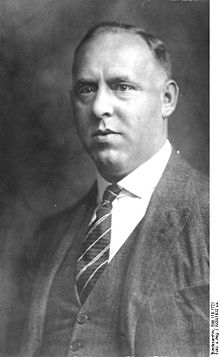
1925 Weimar: Gregor Strasser is entrusted by Hitler with building up the NSDAP in the north. (Maser)
1931 Birth: Rupert Murdoch Australian media tycoon, newspaper publisher:
Knowing that sensationalism would attract tens of thousands of readers, Rupert Murdoch, (owner of The Times, Sunday Times and New York Post), offered . . . 2.5 million dollars for the American rights, [to the 'Hitler Diaries'] plus $750,000 for serialization in Britain and the Commonwealth. The American rights were bought by Americans William Broyles and Maynard Parker of Newsweek, after offering $500,000 more, but Murdoch was offered the British and Commonwealth rights. Representatives for Rupert Murdoch were enraged. After losing their tempers at a meeting, a Stern representative sent them away with nothing. After finding out about his failure, Rupert Murdoch said he was willing to pay $3.75 million dollars for world rights. Stern representatives then got greedy..
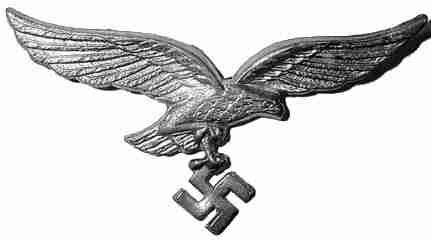
1935 The Luftwaffe: Hitler announces the existence of the new German air force, headed by Hermann Goering.
1935 Nazi Eugenics: A meeting takes place of Workgroup II of the Expert Advisory Council for Population and Race Policy. Professors Fischer, Guenther, and Lenz discuss with civil servants from the Ministry of the Interior the illegal sterilization of German 'colored' children. Professor Roedin calls for the sterilization of psychopaths. (THP) [See: What Was the Nature of Hitler's Anti-Semitism?]
1938 Anschluss: Seyss-Inquart, in Austria, speaks to Goering, in Berlin, by phone:

Goering: How do you do, doctor? My brother-in-law, is he with you?
Seyss-Inquart: No.
Goering: How are things with you? Have you resigned or do you have any news?
Seyss-Inquart: The Chancellor has cancelled the elections for Sunday, and therefore he has put S [Seyss-Inquart] and the other gentlemen in a difficult situation. Besides having called off the elections, extensive precautionary measures are being ordered; among others, curfew at 8 PM.
Thereafter a conversation takes place between Goering and Hitler: Afterwards Goering again telephones Seyss-Inquart at 2:05:

Goering told Seyss-Inquart that Berlin did not agree whatsoever with the decision made by Chancellor Schuschnigg since he did not enjoy any more the confidence of our Government because he had broken the Berchtesgaden Agreement, and therefore further confidence in his future actions did not exist. Consequently the national Ministers, Seyss-Inquart, and the others are being requested immediately to hand in their resignations to the Chancellor, and also to ask the Chancellor to resign. Goering added that if after a period of 1 hour no report had come through, the assumption would be made that Seyss-Inquart would no more be in a position to telephone. That would mean that the gentlemen had handed in their resignations. Seyss-Inquart was then told to send the telegram to the Fuehrer as agreed upon. As a matter of course, an immediate commission by the Federal President for Seyss-Inquart to form a new cabinet would follow Schuschnigg's resignation.
At 2:45 PM Goering tells Seyss-Inquart over the telephone that it is not enough for Schuschnigg to cancel the elections. 20 minutes later he telephones Seyss-Inquart to state that Schuschnigg must resign.
At around 5:26 PM Goering is faced with the news that Miklas, the President, is refusing to appoint Seyss-Inquart as Chancellor, and he issues instructions as to the ultimatum that is to be delivered to Miklas:
Goering: Now remember the following: You go immediately, together with Lieutenant General Muff, and tell the Federal President that if the conditions which are known to you are not accepted immediately, the troops who are already stationed at and advancing to the frontier, will march in tonight along the whole line, and Austria will cease to exist. Lieutenant General Muff should go with you and demand to be admitted for conference immediately. Please inform us immediately about Miklas' position. Tell him there is no time now for any joke. Just through the false report we received before, action was delayed, but now the situation is such that tonight the invasion will begin from all the corners of Austria. The invasion will be stopped and the troops will be held at the border only if we are informed by 7:30 that Miklas has entrusted you with the Federal Chancellorship . . . . M [Lieutenant General Muff] does not matter whatever it might be, the immediate restoration of the Party with all its organizations . . . . And then call out all the National Socialists all over the country. They should now be in the streets; so remember, report must be given by 7:30. Lieutenant General Muff is supposed to come along with you. I shall inform him immediately. If Miklas could not understand it in 4 hours, we shall make him understand it now in 4 minutes.
At around 6:28 PM Goering has an extensively interrupted telephone conversation with Keppler and Muff and Seyss-Inquart. When he tells Keppler that Miklas has refused to appoint Seyss-Inquart, Goering says: "Well, then Seyss-Inquart has to dismiss him. Just go upstairs again and just tell him plainly that S. I. [Seyss-Inquart] shall call on the National Socialist guard, and in 5 minutes the troops will march in by my order."
After an interruption, Seyss-Inquart comes to the telephone and informs Goering that Miklas is still sticking to his old viewpoint, although a new person has gone in to talk to him, and there might be definite word in about 10 minutes:
Goering: Listen, so I shall wait a few more minutes, till he comes back; then you inform me via Blitz conversation in the Reich Chancery as usual, but it has to be done fast. I can hardly justify it as a matter of fact. I am not entitled to do so; if it cannot be done, then you have to take over the power. All right?
Seyss-Inquart: But if he threatens?
Goering: Yes.
Seyss-Inquart: Well, I see; then we shall be ready.
Goering: Call me via Blitz. (IMT)
At around 8:00 PM Goering and Seyss-Inquart have yet another phone conversation after the ultimatum has expired. Seyss-Inquart informs Goering that Miklas is still refusing to name Seyss-Inquart as Chancellor:
Goering: OK, I shall give the order to march in and then you make sure that you get the power. Notify the leading people about the following which I shall tell you now. Everyone who offers resistance or organizes resistance will immediately be subjected to our court martial, the court martial of our invading troops. Is that clear?
Seyss-Inquart: Yes.
Goering: Including leading personalities; it does not make any difference.
Seyss-Inquart: Yes, they have given the order not to offer any resistance.
Goering: Yes, it does not matter; the Federal President did not authorize you, and that also can be considered as resistance.
Seyss-Inquart: Yes.
Goering: Well, now you are officially authorized.
Seyss-Inquart: Yes.
Goering: Well, good luck, Heil Hitler. (IMT)

Arthur Seyss-Inquart becomes Chancellor of Austria, paving the way for a complete Nazi take over, after Hitler issues an ultimatum demanding that Schuschnigg resign as Chancellor. Kaltenbrunner, whose SS had been a decisive factor, is appointed State Secretary for Security Matters in the new National Socialist Cabinet of Dr. Seyss-Inquart. Edmund Glaise-Horstenau, who had been the number-two man in the hierarchy of the Austrian Nazi party, is appointed Vice-Chancellor of Austria under Seyss-Inquart. [See: Austria: The Other Germany.]
From a directive of the Supreme High Command of the Armed Forces (Hitler):
(initialed by Alfed Jodl and Wilhelm Keitel):
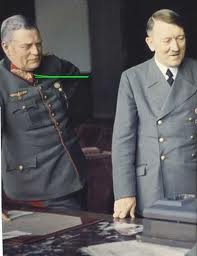
1. If these measures prove unsuccessful, I intend to invade Austria with armed forces to establish constitutional conditions and to prevent further outrages against the pro-German population.
4. The forces of the Army and Air Force detailed for this operation must be ready for invasion and/or ready for action on 12 March 1938 at the latest from 1200 hours. "I reserve the right to give permission for crossing and flying over the frontier, and to decide the actual moment for invasion.
5. The behavior of the troops must give the impression that we do not want to wage war against our Austrian brothers. It is in our interest that the whole operation shall be carried out without any violence but in the form of a peaceful entry welcomed by the population. Therefore any provocation is to be avoided. If, however, resistance is offered it must be broken ruthlessly by force of arms.
Austrian Chancellor Schuschnigg resigns in an attempt to stall a threatened German invasion. From Austrian Chancellor Schuschnigg's farewell speech:
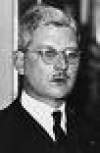
This day has placed us in a tragic and decisive situation. I have to give my Austrian fellow countrymen the details of the events of today.
The German Government today handed to President Miklas an ultimatum, with a time limit, ordering him to nominate as chancellor a person designated by the German Government and to appoint members of a cabinet on the orders of the German Government; otherwise German troops would invade Austria.
I declare before the world that the reports launched in Germany concerning disorders by the workers, the shedding of streams of blood, and the creation of a situation beyond the control of the Austrian Government are lies from A to Z. President Miklas has asked me to tell the people of Austria that we have yielded to force since we are not prepared even in this terrible situation to shed blood. We have decided to order the troops to offer no resistance.
So I take leave of the Austrian people with the German word of farewell uttered from the depth of my heart: God protect Austria.

Constantin Von Neurath writes to the British Ambassador:
It is untrue that the Reich used forceful pressure to bring about this development, especially the assertion, which was spread later by the former Federal Chancellor, that the German Government had presented the Federal President with a conditional ultimatum. It is a pure invention . . . . The truth of the matter is that the question of sending military or police forces from the Reich was only brought up when the newly formed Austrian Cabinet addressed a telegram, already published by the press, to the German Government, urgently asking for the dispatch of German troops as soon as possible, in order to restore peace and order and to avoid bloodshed. Faced with the imminent danger of a bloody civil war in Austria, the German Government then decided to comply with the appeal addressed to it. (IMT)
1939 World War II: Coffee shortage: Joseph Goebbels' attack on the dissatisfied:
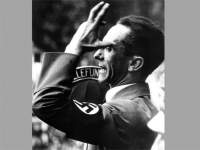
The problem is the shortage of coffee that recently surfaced in several parts of the Reich, and has not yet been entirely overcome. It is actually rather depressing that one must speak of this matter in public. However, there is a certain category of our contemporaries who take pleasure in exploiting every German shortage to amuse themselves or discredit the National Socialist regime. Coffee is hardly a necessity of life, or an indispensable pleasure. It is certainly a pleasant thing. Conversation flows over a pot of coffee, yes? Limiting coffee consumption, or even giving it up entirely for a while, however, hardly damages one's health. The opposite, in fact. It is true that, as Mussolini said in his speech at the May Field, National Socialism and Fascism share a dislike of a comfortable and pleasant life. If coffee is in short supply for a while, it is hardly a necessity of life. It would be something different if potatoes or bread were lacking, things that are necessary for daily life. Coffee is a pure luxury item that one enjoys when one has it, but can easily give up when necessity or economic pressures require. If coffee is in short supply, every German must know that it is not because of the government's ill will that is unwilling to let the people enjoy a cup of coffee, but rather because of a national need, an economic requirement given Germany's situation, one that people have to accept .

1940 Church and Reich: Maintenance of Truce: During a visit to Rome, Joachim von Ribbentrop tells Pius XII that Hitler wants "to maintain their existing truce and, if possible, to expand it. In this respect Germany has made very considerable concessions. The Fuehrer has quashed no less than 7,000 indictments of Catholic clergymen." (THP)
1941 World War II: FDR signs Lend-Lease:
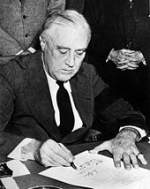
President Franklin D. Roosevelt's Lend-Lease program, which provides money and materials for allies in the war, goes into effect.
The Lend-Lease program was devised by Roosevelt as a means of aiding Great Britain in its war effort against the Germans, by giving the chief executive the power to "sell, transfer title to, exchange, lease, lend, or otherwise dispose of" any military resources the president deemed ultimately in the interest of the defense of the United States. The reasoning was that if a neighbor was successful in defending his home, the security of your home would be enhanced. It also served to bolster British morale by giving them the sense that they were no longer alone in their struggle against Hitler.
The program was finally authorized by Congress and signed into effect on March 11, 1941. By November, after much heated debate, Congress extended the terms of Lend-Lease to the Soviet Union, even though the USSR had already been the recipient of American military weapons and had been promised $1 billion in financial aid. By the end of the war, more than $50 billion in funds, weapons, aircraft, and ships had been distributed to 44 countries. After the war, the Lend-Lease program morphed into the Marshall Plan, which allocated funds for the revitalization of "friendly" democratic nations-even if they were former enemies. (History.com)
1942 World War II: MacArthur leaves Corregidor:
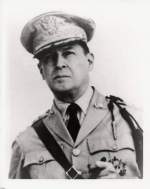
After struggling against great odds to save the Philippines from Japanese conquest, U.S. General Douglas MacArthur abandons the island fortress of Corregidor under orders from President Franklin Roosevelt. Left behind at Corregidor and on the Bataan Peninsula were 90,000 American and Filipino troops, who, lacking food, supplies, and support, would soon succumb to the Japanese offensive.
After leaving Corregidor, MacArthur and his family traveled by boat 560 miles to the Philippine island of Mindanao, braving mines, rough seas, and the Japanese Navy. At the end of the hair-raising 35-hour journey, MacArthur told the boat commander, John D. Bulkeley, "You've taken me out of the jaws of death, and I won't forget it." On March 17, the general and his family boarded a B-17 Flying Fortress for Northern Australia. He then took another aircraft and a long train ride down to Melbourne. During this journey, he was informed that there were far fewer Allied troops in Australia than he had hoped. Relief of his forces trapped in the Philippines would not be forthcoming. Deeply disappointed, he issued a statement to the press in which he promised his men and the people of the Philippines, "I shall return." The promise would become his mantra during the next two and a half years, and he would repeat it often in public appearances.
For his valiant defense of the Philippines, MacArthur was awarded the Congressional Medal of Honor and celebrated as "America's First Soldier." Put in command of Allied forces in the Southwestern Pacific, his first duty was conducting the defense of Australia. Meanwhile, in the Philippines, Bataan fell in April, and the 70,000 American and Filipino soldiers captured there were forced to undertake a death march in which at least 7,000 perished. Then, in May, Corregidor surrendered, and 15,000 more Americans and Filipinos were captured. The Philippines‑-MacArthur's adopted home‑-were lost, and the U.S. Joint Chiefs of Staff had no immediate plans for their liberation. After the U.S. victory at the Battle of Midway in June 1942 . . . . MacArthur launched a major offensive in New Guinea, winning a string of victories with his limited forces. By September 1944, he was poised to launch an invasion of the Philippines, but he needed the support of Nimitz's Pacific Fleet. After a period of indecision about whether to invade the Philippines or Formosa, the Joint Chiefs put their support behind MacArthur's plan, which logistically could be carried out sooner than a Formosa invasion.
On October 20, 1944, a few hours after his troops landed, MacArthur waded ashore onto the Philippine island of Leyte. That day, he made a radio broadcast in which he declared, "People of the Philippines, I have returned!" In January 1945, his forces invaded the main Philippine island of Luzon. In February, Japanese forces at Bataan were cut off, and Corregidor was captured. Manila, the Philippine capital, fell in March, and in June MacArthur announced his offensive operations on Luzon to be at an end; although scattered Japanese resistance continued until the end of the war in August. Only one-third of the men MacArthur left behind on March 11, 1942, survived to see his return. "I'm a little late," he told them, "but we finally came." (History.com)
1943 World War II: War at Sea: From a monitored account of a talk by a German naval war reporter on the long wave propaganda service from Friesland:
Santa Lucia, in the West Indies, was an ideal setting for romance, but nowadays it was dangerous to sail in these waters: dangerous for the British and Americans and for all the colored people who were at their beck and call. Recently a U-boat operating in these waters sighted an enemy windjammer. Streams of tracer bullets were poured into the sails and most of the Negro crew leaped overboard. Knowing that this might be a decoy ship, the submarine steamed close, within 20 yards, when hand grenades were hurled into the rigging. The remainder of the Negroes then leaped into the sea. The windjammer sank. There remained only wreckage, lifeboats packed with men, and sailors swimming. The sharks in the distance licked their teeth in expectation. Such was the fate of those who sailed for Britain and America.
1944 Holocaust: Balkans: 300 Jewish women and children from Dalmatia, who have been interned at Gospic, are deported to the Croat concentration camp at Jasenovac. None survive. The men have already been deported to the Sajmiste death camp near Belgrade. (THP)
1945 Various:

Hitler tells Goebbels: "It must be our ambition also in our times to set an example for later generations to look to in similar crisis and anxieties, just as we today have to look to the past heroes of history. The year 1918 will not repeat itself." (Kershaw) [See: Why Did Hitler Insist on No Surrender?]
Goebbels—still reeling from the Allied capture of the bridge at Remagen—figuratively drops his swastika when he learns that his own home town of Rhedt has been taken by American forces without a fight. He feels personally injured when further word comes down that the Allies are setting up 'a so-called German newspaper' in his old stomping grounds. 'I'll find ways of restoring order,' he promises his diary, and proceeds to formulate plans to send a hit squad of Berlin Party members 'already trained in such acts' to infiltrate enemy lines and assassinate the Mayor of Rhedt, who has reportedly been collaborating with the Americans.' (Read) [See: The Last Days of the Third Reich.]
Markt Schellenberg—a small Alpine village near Hitler's Berghof—holds a memorial ceremony for their war dead. From a Nazi report (filed April 4, 1945) of the incident: "When the leader of the Wehrmacht unit at the end of his speech for the remembrance called for a 'Sieg Heil' for the Fuehrer, it was returned neither by the Wehrmacht present, nor by the Volkssturm, nor by the spectators of the civilian population who had turned up. 'This silence of the masses,' commented an observer from the local police, 'had a depressing effect, and probably reflects better than anything the attitudes of the population.' " (Kershaw) [See: Did the Germans Really Support Adolf Hitler?]
Far East: The Empire of Japan establishes the Empire of Vietnam, a short-lived puppet state, with Bao Äại as its ruler. [For further information, click here.]
1946 Various:
Nuremberg Tribunal: The Testimony of Field Marshal Erhard Milch continues:
In the first place the large number of concentration camps was unknown to everybody, as it was unknown to me. Secondly, nobody knew what went on there. This knowledge was apparently confined to a very small circle of people who were in the secret. Further, the SD was very much feared by the entire population, not only by the lower classes. If anybody tried to gain access to these secrets he did so at the peril of his life. And again, how could the Germans know anything about these things, since they never saw them or heard about them? Nothing was said about them in the German press, no announcements were made on the German radio, and those who listened to foreign broadcasts exposed themselves to the heaviest penalties, generally it meant death. You could never be alone. You could depend upon it that if you yourself contravened that law, others would overhear and then denounce you.
Arrest: Rudolf Hoess:
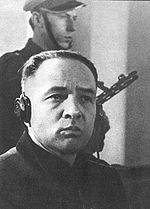
Hanns Alexander was 19 when he left his native Berlin for Britain . . . in 1937. The rest of his family . . . came separately. As soon as war was declared he volunteered for the army and, like most German-Jewish refugees, was accepted into the Pioneer Corps, mainly digging trenches.
But by the end of war he had been moved to Intelligence and, again like many other German-speaking Jewish refugee soldiers, he was sent to Germany to act as interpreter. Only in his case there was a very specific task.
In Germany he joined a group of British soldiers, Jewish and non-Jewish, intent on finding the ruthlessly efficient Hoess. As the Red Army approached from the east to liberate the 20,000-acre Auschwitz complex, Hoess had sent his wife and five children home from the comfortable villa they occupied on the edge of the site, and then quietly slipped away. The British team went to Hoess’s wife and threatened her with handing over her oldest son to the Russians unless she revealed her husband’s whereabouts.
Under pressure Hedwig Hoess gave the location where her husband was working as a farmer under the assumed name of Franz Lang. He was living in a barn. After he had been severely beaten and confessed to his true identity, Hanns Alexander arrested him and handed him over to the International Military Tribunal at Nuremberg, where he gave the first authoritative and detailed account of the entire camp operation. Senior Nazis on trial could no longer claim ignorance of the extermination policy and its implementation.
Hoess was then handed over to the Polish authorities, who tried him in Warsaw for murder and hanged him on 16 April 1947 on the same spot in view of his villa (now occupied by a retired teacher) where prisoners of Auschwitz were publicly hanged. [For further information, click here.]
1947 Truman thanks Herbert Hoover for aiding post-WWII reconstruction:

President Harry Truman writes to his good friend, former President Herbert Hoover, thanking him for his help in investigating post-World War II reconstruction issues in Germany and Austria. Truman's letter was just one exchange in a friendship that began in 1945 when Truman first consulted the former president for his expertise on foreign policy.
Truman's letter was in response Hoover's work in 1945-46 to combat the famine in Europe and Asia that had resulted largely from the devastation of World War II. Truman sought out Hoover for his experience leading the effort to stave off a similar food crisis caused by World War I. In 1914, Hoover had established a food-aid program for Belgium while serving as U.S. food administrator. He had also headed the American Relief Administration from 1917 to 1921 and implemented critical food-rationing and distribution policies for the U.S., Europe and Russia before becoming president in 1929. Truman appointed former President Hoover as honorary chairman of the Famine Emergency Committee in 1946. Hoover, at age 71, worked tirelessly, traveling the world to study the famine and devising solutions to food-distribution problems.
In 1947, Truman assigned Hoover to conduct a survey on the German and Austrian food crisis. He also asked Hoover to propose ways to wean Germany and Austria off U.S. financial aid and retool their economies to be more self-supporting. After filing his report on Germany and Austria, Hoover returned to Washington, D.C., and had barely settled into his new job when Truman asked him to chair the Commission on Organization of the Executive Branch; he agreed. In this capacity, Hoover worked closely with Truman in devising ways to pare down and refine the post-World War II federal government to improve administrative efficiency, curb the powers of the executive branch and loosen what both men considered to be excessive regulatory control of the private business sector. This commission became known as the Hoover Commission. (History.com)
1963 Death: Jean-Marie Bastien-Thiry, model for the Jackal:
Clutching a rosary, French officer Jean-Marie Bastien-Thiry was shot by a firing squad in the Paris suburb Ivry-sur-Seine for attempting to assassinate [French President] Charles de Gaulle.
Perhaps no anticolonial struggle left a more considerable intellectual and cultural footprint than the Algerian War of Independence against France. It gashed the French polity as well; the right violently rejected the swelling sentiment to end their country's 132-year occupation. It is often said that the conservative Charles de Gaulle was the only man who could have engineered the departure with the support of a sufficient portion of the populace: but a sufficient portion by no means meant all, and every blunder multiplying the [French] body count was laid on de Gaulle's head besides.
On August 22, 1962‑-just weeks after that war successfully expelled the European power‑-an assassins' team led by Bastien-Thiry (collaborating with the far-right Organisation de l'armée secrète) unleashed a machine gun fusillade at de Gaulle's car. Hundreds of shots were fired; miraculously, the president and all his aides all escaped unharmed.
Although the actual gunmen were reprieved by their intended target, their manager was not. Said de Gaulle, "The French need martyrs . . . . I gave them Bastien-Thiry. They'll be able to make a martyr of him. He deserves it." Certainly Bastien-Thiry had that in mind. At his trial . . . . he addressed his conduct to posterity.
1985 Mikhail Gorbachev picked to succeed Chernenko:
Capping his rapid rise through the Communist Party hierarchy, Mikhail Gorbachev is selected as the new general secretary and leader of the Soviet Union, following the death of Konstantin Chernenko the day before. Gorbachev oversaw a radical transformation of Soviet society and foreign policy during the next six years. [For further details, Click here.]
1990 Lithuania proclaims its independence from the USSR—the first Soviet republic to do so:
The Soviet government responded by imposing an oil embargo and economic blockade against the Baltic republic, and later sent troops.
Lithuanians have lived along the Nemen River and the Baltic Sea for some 3,000 years, and during the medieval period Lithuania was one of the largest states in Europe, stretching from present-day European Russia to as far as the Black Sea. In the late 14th century, Lithuania united with Poland in forming a commonwealth, and with the third partition of Poland in 1795, Lithuania was absorbed into Russia.
In the 19th century, a Lithuanian linguistic and cultural revival began, and with the signing of the Treaty of Brest-Litovsk between Russia and Germany in 1918, Lithuania achieved independence. For the next two decades, however, Poland, Germany, and the USSR all interfered with Lithuania's affairs. In 1940, Soviet forces occupied the country, but in 1941 the Nazis replaced them. During World War II, many Lithuanians fought alongside the Germans against the Soviet Union, but by 1944 the country was liberated and a pro-Soviet communist regime was installed.
n the late 1980s, Soviet leader Mikhail Gorbachev's policy of glasnost, or "openness," led Lithuania to reassert its identity, and on March 11, 1990, formal independence was proclaimed. Sajudis, a non-communist coalition established in 1988, subsequently won control of the Lithuanian parliament and Vytautas Landsbergis became Lithuania's first post-Soviet head of state. In January 1991, Soviet paratroopers and tanks invaded Vilnius, the Lithuanian capital, beginning a standoff that lasted until September 6, 1991, when the crumbling Soviet Union agreed to grant independence to Lithuania and the other Baltic republics of Estonia and Latvia. (History.com) "
Edited by Levi Bookin (Copy editor)
levi.bookin@gmail.com

FAIR USE NOTICE: This site may contain copyrighted material the use of which has not always been specifically authorized by the copyright owner. We are making such material available in our efforts to advance understanding of historical, political, human rights, economic, democracy, scientific, environmental, and social justice issues, etc. We believe this constitutes a 'fair use' of any such copyrighted material as provided for in section 107 of the US Copyright Law. In accordance with Title 17 U.S.C. Section 107, the material on this site is distributed without profit to those who have expressed a prior interest in receiving the included information for research and educational purposes. If you wish to use copyrighted material from this site for purposes of your own that go beyond 'fair use', you must obtain permission from the copyright owner.
Please note that the list-owner and the moderator are not responsible for, and do not necessarily approve of, the random ads placed on our pages by our web server. They are, unfortunately, the price one pays for a 'free' website.